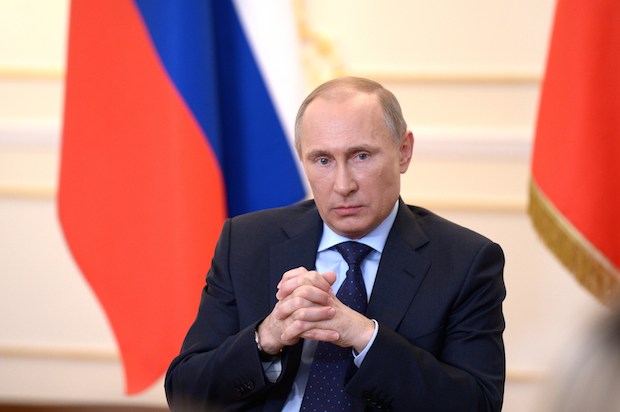Just wondering: what would we be doing now about Crimea if the referendum a week ago had been done nicely? I know it’s not a good time to ask what with protestors storming bases in the east occupied by Ukrainian forces, but it seems pretty fundamental to me.
The PM yesterday opined that the poll had been conducted ‘at the barrel of a Kalashnikov’ and was a twentieth century way of doing things (interesting put-down, that). And indeed, there’s no gainsaying that it was done in an inordinate hurry, that the entire exercise was conducted in the presence of about 20,000 troops – Russian supporting, or just Russian, take your pick – the opposition had next to no opportunity to conduct a counter-campaign, the option of keeping the status quo wasn’t even on the ballot paper and the turnout was quite embarrassingly excessive in places such as Sevastopol. So, not an object lesson in how to get a democratic mandate, then, even if it weren’t that anyone in favour – Tatars and many Ukrainians – simply boycotted the thing.
But, I repeat, if it had been nicely done, what would our reaction have been? Because the reality is that the result would unquestionably have been the same. Maybe with a two thirds majority rather than a nine in ten one, but still overwhelming. An embarrassingly large majority of people in Crimea want to be in Russia, not Ukraine.
Now, I do appreciate that exercises in self-determination are only as valid as their context. I should, for instance, take a dusty view of a poll on secession conducted by Serbs in the north of Kosovo on whether they’d like to unite with Serbia; if you draw a line around a disgruntled ethnic minority and hold a vote inside it, well, you’re bound to get a majority result, but not a valid one. Just like the Serb Republic in Bosnia, which is an internal border around an ethnically cleansed land grab; if you asked its inhabitants if they’d like to unite with Serbia, I think we know what they’d say. Whereas I did very strongly take the view that the constituent parts of the former Yugoslavia, including Kosovo, were entitled to self-determination from the Yugoslav federation, on the basis that they were, are, coherent entities.
The critical factor about polls of this sort is in the first place whether the context is right, secondly whether there are proper rights for minorities (secession is all too often an occasion for ethnic cleansing, as I am afraid, happened in Kosovo) and lastly whether the poll itself is fairly conducted, and I think we can agree the Crimean one was flawed. In this case there’s the further disagreeable possibility that, on the back of this, Russia may intervene, Sudetenland-style, to protect Russian minorities elsewhere in Ukraine. But on the important question, I’m not sure we can take the view that Crimea isn’t entitled to self-determination.
Granted, the population which was polled is significantly different from the one that would have voted had Stalin not purged the place of its Tatar Muslims, only some of whom managed to return later – and there are those of us for whom the very name of Tatary remains indescribably romantic. President Putin was rather interesting about that in his speech accepting Crimea into Russia. But we are all by now aware that Krushchev handed Crimea on a plate to Ukraine in the fifties, though in the bigger context of the Soviet Union. The place is a peninsula, physically separable from its neighbours, and as close to Russia as to Ukraine. As I say, there is no question about the will of the majority of the people on whether they want to be Russian. So why, in principle, may it not secede?
President Putin has, if you are to take him at his word, given assurances that Crimea is not going to be a useful precedent to justify intervention elsewhere in eastern Ukraine to, ahem, ‘protect’ Russians. He has given quite explicit promises about the welfare of minorities, including protection of their language rights. On the Tatars, he says: ‘there was a time when Crimean Tatars were treated unfairly, just as a number of other peoples in the USSR. There is only one thing I can say here: millions of people of various ethnicities suffered during those repressions….We have great respect for peoples of all the ethnic groups living in Crimea.’ Granted, Mr Putin also quite unwarrantably said that the referendum showed that Tatars supported secession, but apart from that patent fib, this, as a statement of intent, seems pretty sound.
The West has said, quite simply, that the poll was a breach of international law. Certainly it happened without the acquiescence of Ukraine. But what if we had – given our muscle – insisted that Ukraine should allow a poll in Crimea to take place? What if the poll had been conducted properly? And what if it had produced exactly the same result as now? What then? So far I haven’t heard anything from any of our leaders to suggest that while it is quite, quite proper for Ukraine to determine its own destiny, it is quite, quite wrong for Crimea to do so.







Comments